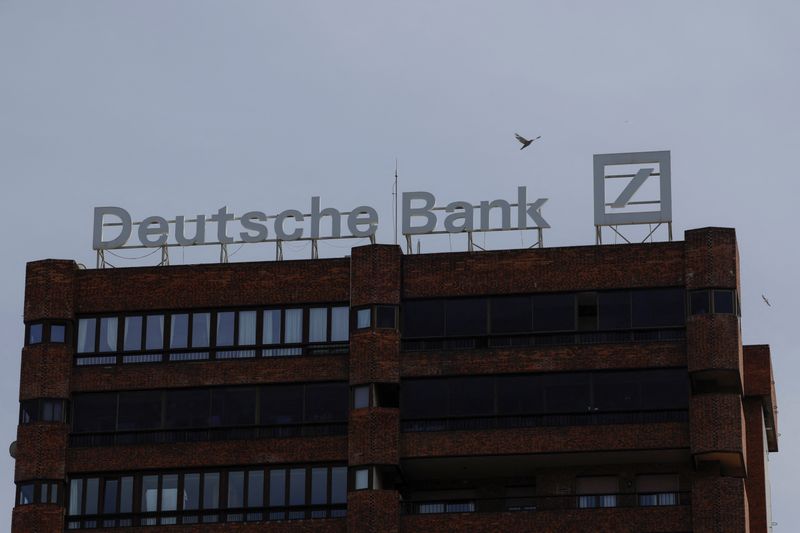By Tom Sims and Matthias Inverardi
FRANKFURT (Reuters) -Deutsche Bank posted on Thursday a better-than-expected 10% increase in first-quarter profit as a resurgence in fixed-income trading and deal-making propelled revenue at its investment banking division.
The gains mean investment banking was able to reclaim its position as Deutsche's biggest breadwinner from its giant retail division that had recently benefited from higher interest rates but suffered from customer service glitches.
Its shares, which were already up about 60% over the past year, were 7% higher mid-afternoon in Frankfurt after executives sounded optimistic about the bank's prospects.
The group's figures marked the 15th consecutive quarter of profit - a considerable streak in the black for Deutsche after hefty losses during the last decade.
Deutsche's net profit attributable to shareholders was 1.275 billion euros ($1.37 billion) in the quarter. That compares with profit of 1.158 billion euros a year earlier, and it was better than analyst expectations for profit of around 1.2 billion euros.
Competitor BNP Paribas (EPA:BNPP) also beat estimates on Thursday, while Barclays (LON:BARC) reported a profit drop.
"These results represent another step forward," Deutsche Chief Executive Officer Christian Sewing said in a note to staff.
He said the bank remained committed to its 2025 goals, which include a decline in its cost-to-income ratio that analysts believe may be too ambitious.
Despite the bank's better-than-expected earnings, Deutsche is navigating a weak economy in its home market, even if German business morale has improved.
And regulators have warned that 2024 will be less rosy for German bank profits as a property crisis weighs and loans go bad.
Deutsche's investment banking revenue rose 13% during the quarter, better than the 6.9% rise expected by analysts. A 5% drop in revenues at the corporate bank missed expectations for a 3.5% fall, and the retail division's 2% revenue decline came in as forecast.
Revenue for fixed-income and currency trading, one of the bank's largest businesses, rose 7% from a weak quarter a year earlier. That beat expectations for a 2.6% gain and was ahead of a 3% drop by the biggest U.S. banks.
Origination and advisory was a bright spot, with revenue rising 54%, compared with expectations of a 36% increase and outpacing gains of 25% among big U.S. competitors.
Moody's called the results a "solid cushion" for any troubles in real estate. KBW analysts, who rate Deutsche underperform, said the earnings were "OK but nothing special".
Analysts now expect the investment bank to remain Deutsche's biggest income generator through 2026. That is a shift in expectations from last year, when analysts forecast the retail bank would dominate.
Deutsche Bank (ETR:DBKGn) set out in 2019 to reduce dependence on its volatile investment bank and rely instead on more stable businesses that serve companies and retail customers as a way to restore profitability.
Results have been mixed.
The retail division, while benefiting from higher interest rates and the income that provides, has drawn the scorn of regulators after it botched the integration of its Postbank arm, leaving customers complaining that they were locked out of their accounts and unable to reach call centres.
Now, the European Central Bank is expected to begin cutting interest rates, resulting in less income generated from the difference between what banks earn on loans and pay out on deposits.
Deutsche, whose share price has lagged other big European banks, recently got a vote of confidence, winning a new top investor.
In the quarter a year earlier, the bank's shares had dropped 15% in a single day on fears of contagion after banks had to be rescued in the United States and in Switzerland.
The turmoil caused investors to panic and customers to withdraw deposits, prompting a rare intervention by Germany's Chancellor Olaf Scholz, who said: "There's no reason to worry."
Now Deutsche Bank is contending with fallout from commercial real estate, which has come under pressure in the United States and Germany.

The bank forecast last month that it expects the current crisis in commercial real estate to continue in 2024 and that provisions for loan losses will be at the upper end of its projected range.
($1 = 0.9339 euros)